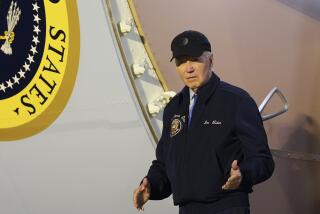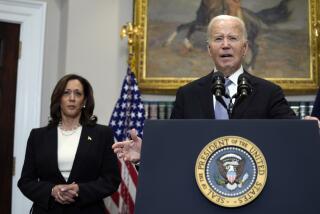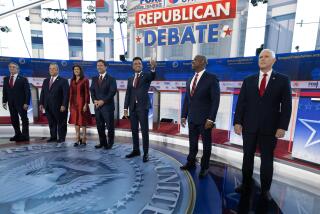Candidates Feud Over Iraq Arms
- Share via
PONTIAC, Mich. — President Bush fought Wednesday to contain the political fallout from a cache of missing military explosives in Iraq, accusing Democratic Sen. John F. Kerry of making “wild charges” and of denigrating U.S. forces.
In his first public remarks on the disappearance of 380 tons of conventional explosives near Baghdad, Bush said Kerry was jumping to conclusions and “denigrating the actions of our troops and commanders in the field” without knowing the facts.
“Unfortunately, that’s part of a pattern of saying anything it takes to get elected,” Bush said during a campaign stop in Vienna, Ohio.
The president, breaking two days of silence on the issue, said military authorities were investigating a number of explanations, including the possibility that former Iraqi leader Saddam Hussein removed the explosives from a set of bunkers before coalition troops arrived.
Kerry, in turn, said the president was “dodging and bobbing and weaving” to avoid responsibility for the failure of coalition forces to secure the bunkers of explosives after the fall of Hussein’s regime in April 2003.
Hours after Bush accused him of denigrating U.S. soldiers, the Democratic nominee shot back, saying the failure to secure the cache of powerful weapons put American troops in more danger.
“Mr. President, for the sake of our brave men and women in uniform, for the sake of those troops who are in danger because of your wrong decisions, you owe America real answers about what happened -- not just political attacks,” Kerry said during a rally before 7,500 foot-stamping, whistling supporters in Rochester, Minn.
The sharp statements dominated the day’s campaign debate, putting Bush on the defensive and giving the Massachusetts senator an opportunity to question the incumbent’s credentials as commander in chief.
Kerry, hammering on the explosives issue for the third day in a row during a campaign event in Sioux City, Iowa, cited a New York Times story Wednesday to try to contradict the White House’s assertions that a U.S. brigade did not find the explosives when they visited the site April 10, 2003, the day after Baghdad fell.
The commander of a U.S. brigade, Col. Joseph Anderson, was quoted in the Times as saying that his troops “happened to stumble on” the Al Qaqaa compound south of Baghdad on April 10, 2003, and that there were no plans to search the bunkers.
The commander also told the Times that U.S. forces were not ordered to search and secure the explosives that the International Atomic Energy Agency reported had been stored there at least two weeks earlier.
Kerry was quick to place the blame on Bush, not the soldiers. “They did their job, but the commander in chief failed to do his,” he said.
The Democrat called the disappearance of the powerful HDX and RDX munitions “a growing scandal,” and suggested that Vice President Dick Cheney was “becoming the chief minister of disinformation” because he insisted the administration was not at fault.
Bush said an investigation was underway, and cautioned voters about Kerry’s criticism.
“A political candidate who jumps to conclusions without knowing the facts is not a person you want as your commander in chief,” Bush said during a stop in Lancaster County, Pa.
Since the occupation began, he said, coalition forces have secured thousands of tons of military explosives from other sites in Iraq. Those weapons would still be in Hussein’s hands if the U.S.-led forces had not toppled his government, he said.
After ignoring reporters’ questions about the missing explosives earlier in the week, Bush spoke out Wednesday after being provided an official Pentagon account of the military’s observations of the Al Qaqaa facility.
The two-day delay in the Pentagon’s response to the news reports troubled some of the military brass, one senior Defense official said. The Pentagon press office e-mailed its “talking points” on the explosives to administration officials late Wednesday.
“We have talking points now?” the official said, angered by the slow response. “Two days after the story broke?”
The Pentagon account said the Al Qaqaa facility was not secured when soldiers from the 3rd Infantry Division arrived April 3, engaging in a two-day battle with about 200 Iraqi fighters in and around the facility.
Troops from the 75th Exploitation Task Force inspected the compound three times afterward -- on May 8, May 11 and May 27 -- and reported no weapons of mass destruction, the statement said. By that time, the site had been “looted and stripped and vandalized,” according to the talking points.
As Kerry and Bush sparred over the issue in campaign appearances across the Midwest, their running mates engaged in sharp attacks of their own.
Sen. John Edwards (D-N.C.) accused the president of trying to duck responsibility with a disingenuous suggestion that Kerry was attacking soldiers in arms, not the commander in chief.
“Aren’t you sick and tired of George Bush and Dick Cheney using our troops as shields to protect their own jobs?” Edwards asked students, faculty and supporters at a rally at Miami Dade College in Kendall, Fla., a Miami suburb.
“Our military did their job,” Edwards said. “George Bush did not do his job. Do you want four more years of this?”
Cheney, campaigning in Washington, Pa., said, “John Kerry doesn’t know if those explosives were even at the weapons facility when our troops arrived. The charge he is making is so wild that his own advisors are saying they don’t know if it’s true.”
Bush’s comments on the missing explosives came as he launched a two-day swing through Pennsylvania, Ohio and Michigan, three states that will play crucial roles in determining the outcome of Tuesday’s election.
Addressing a cheering crowd of supporters in Vienna, Bush made an appeal for Democrats to break ranks and support his reelection. No Republican has been elected president without carrying Ohio.
“I’m a proud Republican, but I believe my policies appeal to many Democrats,” he said.
Two of the president’s four stops -- in Youngstown, Ohio, and Pontiac -- were in regions that voted for Al Gore in 2000.
Kerry campaign aides derided the effort, noting that Democratic voters were usually excluded from Bush campaign rallies.
“How can he reach out to Democrats if they aren’t allowed into the event?” asked Kerry spokesman Phil Singer.
In Pontiac, the president made a special pitch to black voters, meeting with a group of African American supporters before the event and arranging for an African American political ally, Texas Railroad Commissioner Michael Williams, to open the rally in the Silverdome.
The rally was held in one end of the stadium, which can hold 80,000. The rest of the dome, including all of its upper seats, were draped off from view.
Kerry made a swing through two Midwestern states, hoping to shore up support in Minnesota, which Democrats had thought was firmly in Kerry’s camp, and gain an edge in Iowa, where both campaigns are engaged in trench warfare.
Hopscotching from one misty farm landscape to another, Kerry pressed a two-pronged attack: that Bush had failed in foreign policy and that he had neglected the country’s domestic needs.
On the airwaves, Republicans and Democrats unleashed one of their final volleys of television advertisements Wednesday.
The Florida Republican Party attacked Kerry as weak against terrorism in a Spanish-language spot that showed pictures of Al Qaeda leader Osama bin Laden and Cuban President Fidel Castro. The Republican National Committee had another 15-second spot that simply asked: “Is John Kerry too weak?” And the National Rifle Assn. ran an ad in Wisconsin that depicted Kerry as “anti-gun.”
Kerry and the Democrats fought back with a series of ads promoting healthcare plans and depicting Bush as insensitive to job losses in Wisconsin.
“I will stop at nothing when it comes to capturing and killing the terrorists,” Kerry said in ad in Florida, reminding voters of his Vietnam War service. “I will never waver, flinch or back down against this enemy, and neither will America.”
*
Vieth reported from Pontiac, Gold from Rochester. Times staff writers Maura Reynolds in Pontiac, James Gerstenzang in Washington, Pa., Maria L. La Ganga in Kendall, and John Hendren and Nick Anderson in Washington, D.C., contributed to this report.
More to Read
Get the L.A. Times Politics newsletter
Deeply reported insights into legislation, politics and policy from Sacramento, Washington and beyond. In your inbox twice per week.
You may occasionally receive promotional content from the Los Angeles Times.










